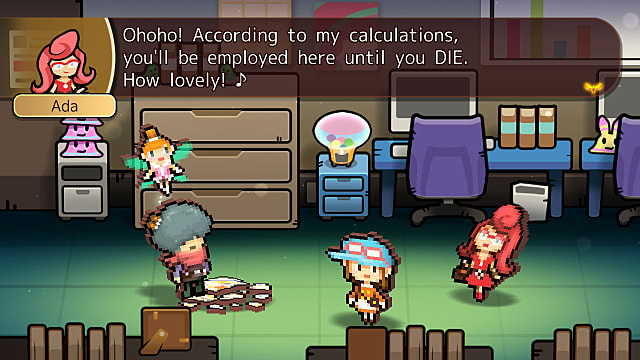

Have you ever wondered what it might be like to work at a theme park staffed by otters, where slightly unhinged guests demand you take them to fight the Dark Lord, Alfie the Teddy Bear in a labyrinth of dungeons beneath the park? Yeah, probably not.
Fortunately, FuRyu Games did imagine that with Work x Work, which XSeed localized for Western audiences as Heroland.
The game tasks you with taking on Alfie, and a lot more besides, all because you need money to send home to your sad, sick parents. It's a fantastic blend of Earthbound-style quirkiness and fourth-wall-breaking fun, wrapped in a smart combat system that offers a surprising amount of depth.
Heroland might not be perfect in all ways, but it's ideal for anyone seeking a fun, just-complex-enough RPG that shakes up the formula.
Heroland Review: Work Hard, Play Hard

Heroland's basic premise revolves around Lucky helping theme park visitors have as much fun on their dungeon tours as possible — or else.
As these things go, poor Lucky isn't so lucky. After breaking an incredibly valuable vase, he's stuck working at Heroland until the damages are paid off — which is basically forever.
Like anyone who's worked in a public-facing job knows, your story doesn't matter; the customer does. Lucky's sad story quickly gets railroaded by his more rambunctious customers, particularly Prince Elric "18" and his partially deluded quest to regain his line of succession by accomplishing great deeds at a theme park.
Heroland knows what it's like to work in a crappy job when you don't have any other choice. In fact, the opening hours read like a more comedic version of a typical "9 to 5" horror story. Customer satisfaction comes first, so make the park guests angry, and your pay and guide level decreases.
Your job is to be as unobtrusive as possible, letting the customers create their own experience and stepping in only when it seems like they'll screw everything up. Money earned during tours? It goes back to the park through the item and blacksmith shops. Treasures found during dungeon tours? Better dole them out to the guests if you want to increase their satisfaction scores.
Along the way, you meet up with a wide variety of diverse, hilarious, and downright bizarre characters, either visiting or working at the park.
Some are loyal to the company like the item shop girl. But most of your co-workers are equally disenchanted with the system. They don their boss costumes to lurk at the end of a dungeon, resigned to their fate. They just want to make it to the end of the day.
This is the pain we all feel, and seeing it play out in such humorous, overexaggerated form in Heroland creates a sense of connection with these poor hapless souls trapped in a system they can't control.
There's plenty of emphasis on non-satirical humor as well, from slapstick and wordplay to jabs at fan and gaming culture, and even references to classic and modern gaming jokes. Your fairy companion Lua, for example, is the Exposition Fairy, who speaks for all the silent protagonists, like you, who work in the park.
Then there's Phantom Thief B(iscuit) who strikes fear into the otter community when she invades the park early on. Hopefully, they say, she doesn't steal adorable rabbit purses — or hearts. Yes, they said The Thing from Persona 5.
What's fantastic about all this is how it's consistent. Doing humor right is hard, and maintaining it throughout a lengthy, text-heavy script is even harder. But XSeed's talented writers strike again.
There wasn't a single moment in Heroland that fell flat for me. Some are quietly funny, some are chuckle-worthy, and plenty others are genuinely laugh-out-loud funny. The writing team definitely deserves recognition for the script; it's an absolute gem.
Even better is how the wacky plot and setup are integrated into gameplay.
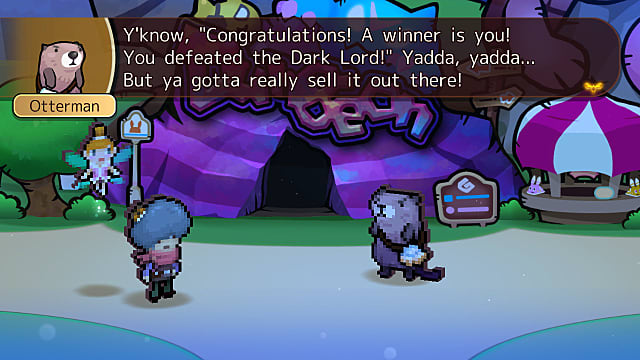
Most of the other characters you come across are guests at the park — though some employees do double-duty as guests too — and these are the ones you'll take on guided dungeon tours through. "Guided" is the key here, since you don't actually control your party.
Guests take on specific roles during combat: Tank, Healer, Mage, Warrior, or Freelancer. They all have a preferred role that increases their satisfaction when they get to fill it, but you're not bound to give them what they want every time.
Guests perform battle actions as they see fit. However, this isn't completely passive, like Yo-Kai Watch or Miitopia. You can step in to guide things in a way that won't get everyone killed.
Your guidance ranges from advising individual party members what action to take next to issuing orders for the entire party, and dishing out items from the limited stock you're allowed to take on each tour. The AI is pretty competent, though healers do have a tendency towards self-preservation, and which enemies tour guests target is a bit iffy sometimes.
It's important to plan ahead, too. Each action takes time to perform, and most special moves have a charge time on top of that. The thing is, Lucky's pretty out of shape, as Lua helpfully informs you. That means guidance actions take a lot out of him.
There's an assistance meter that fills as time progresses. Once full, it lets you take an action and adds an additional layer to planning. That period gets shortened as your guide level increases, and your guide level increases based on guest satisfaction after each tour.
You can increase that satisfaction by using items on a guest, advising them to use the right move, or giving them treasures they like. There's no real way to know what treasure a guest might like other than trial and error, but it's fun to experiment.
Compounding that is the way moves and weapons work. Each guest has a unique attack, and their other available moves are determined by the weapons they equip. All attacks, except basic ones, have a limited number of uses per tour. Weapon SP and Character SP gauge uses, and some weapons break as well.
Managing how often guests use their special attacks becomes even more critical as you progress through the different dungeons, lest you wind up at a boss fight with only basic moves at your disposal. Finding powerful weapons that grant stronger skills is a bit of a drag at times, though. The Heroland staff isn't kidding when they call rare drops rare.
Then there's party management. You assemble a team of four heroes for each tour and depending on the tour, you'll sometimes have VIPs who can't be changed out. Unique character skills mean each guest isn't just a palette swap fulfilling a fundamental role.
If you want or need a team prioritizing resistance to specific elements or strengths against foes and don't have room for a healer, then certain tanks can work both as damage sponges and healers. The possible combinations only broaden as you go through each chapter and take responsibility for even more guests.
Fortunately, you get a bit of a heads-up about what to expect and loosely how to plan for new dungeons with staff meetings that lay out the "monsters" on duty, their weaknesses, status effects to watch out for, and which staff member will be dropping rare items.
Unfortunately, there's no way to access records of these meetings after they occur, so pay attention, lackey.
Attack type, weak against heat, elderly...What.
It all combines to create a system with a surprising and satisfying amount of depth that fits in perfectly with the narrative setup.
Only, you wouldn't know that from the first chapter, which is easily Heroland's weakest from a gameplay perspective. It's a necessary tutorial that mixes teaching with action, and you'll appreciate it later.
However, that also means the tension is pretty low; factors like SP conserving and organizing a strong or versatile party don't come into play yet. You're left feeling like it's a bit too same-y each time.
Granted, some same-y bits don't disappear. Dungeon tours are this game. You choose locations in Heroland itself by selecting from a map followed by mini-scenes that are always worth experiencing. It's all preparation for getting you back into the park's dungeons, though. In the main storyline, that's fine because each dungeon offers something new.
The sidequests and free tours don't, though. You're venturing back through dungeons and areas you cleared in the main story to gather rare drops, raise your party's levels, or complete sidequests.
It might be an issue for some because you aren't technically exploring either; dungeon traversal is you picking a tile to move the party forward. It's important to choose your tile location wisely depending on the monsters you might face, but again, it's all about the combat.
It's something you'll need to do a lot of as well, both for sidequests — unlocked by raising friendship levels — and level grinding, the latter of which is necessary at times. There is, however, a speed-up option that triples battle speed and is immensely helpful in making level grinding tolerable.
Heroland Review — The Bottom Line
Pros:
- Superb script bursting with personality
- Deep management and combat system
- Delightfully wacky and memorable characters
- Tons of party customization options
- Overall compelling gameplay loop
Cons:
- A bit grindy at times thanks to necessary location repetition
- Slightly frustrating finding new weapons
- Slow first chapter
Despite its few flaws, Heroland is one of my surprise favorites of the year. It's a blast to play through, even if it drags at times, and the scenario, characters, and writing are just excellent.
If you're looking for a unique take on RPGs that is more than willing to poke fun at itself, the genre, and life in general, this is definitely the game for you.
[Note: XSeed provided a digital copy of Heroland for the purposes of this review].
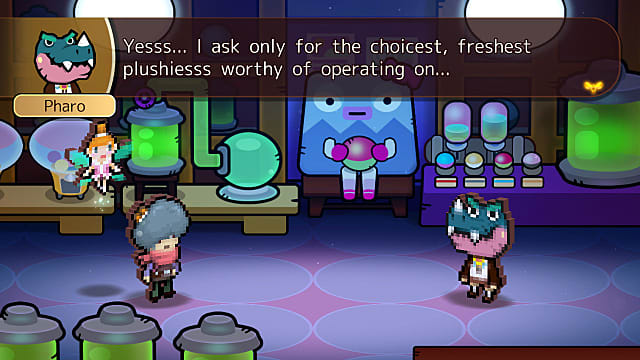
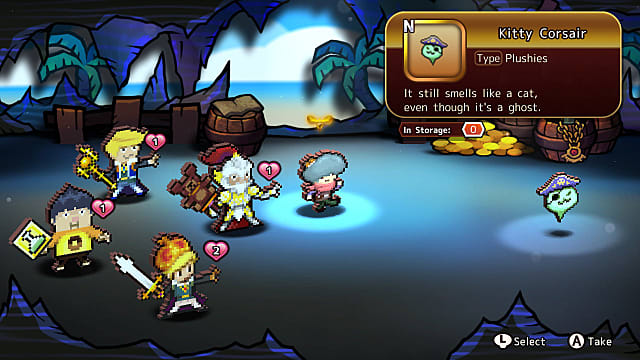
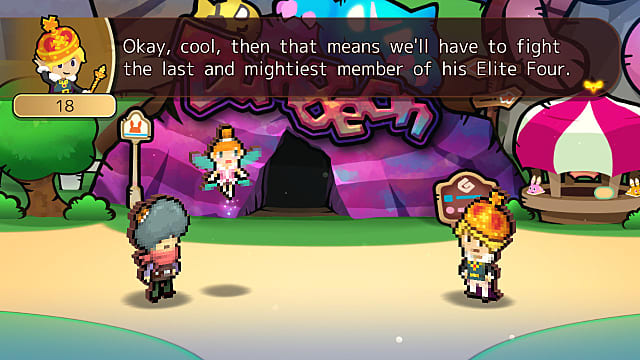
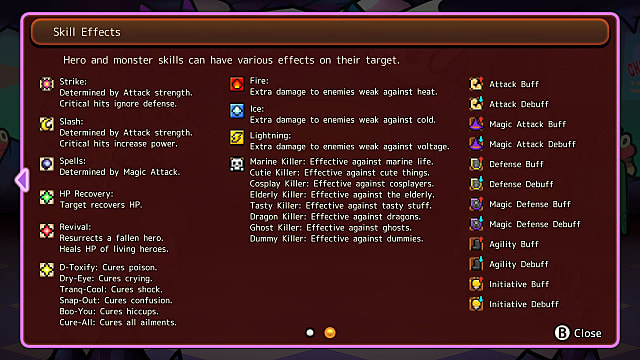
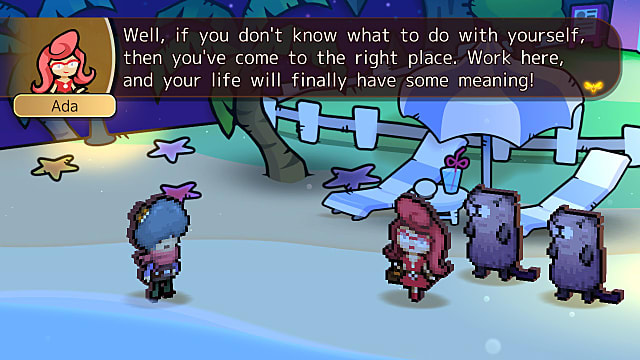
0 comments:
Post a Comment